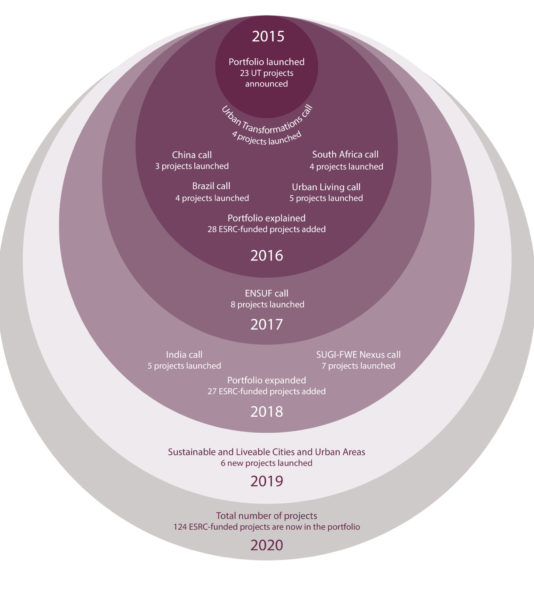An overview of the Urban Transformations programme
 As the Urban Transformations programme approaches its end, this brief introduction by Professor Michael Keith – excerpted from the longer report, The ESRC Urban Transformations Programme: An Overview – presents some of the key milestones and achievements of the portfolio over the last five years.
As the Urban Transformations programme approaches its end, this brief introduction by Professor Michael Keith – excerpted from the longer report, The ESRC Urban Transformations Programme: An Overview – presents some of the key milestones and achievements of the portfolio over the last five years.
In setting new priorities in 2014, the ESRC recognised urban studies was an increasingly important subject of interest across the social sciences, yet it had not been the focus of major council investments for over a decade by the early 2010s. After commissioning a series of position papers, the research council tendered the role of director of a potential new programme of urban studies responsible for:
- making an academic case for social science investments that drew on the work carried out by the position papers;
- identifying research priorities in the urban domain;
- optimising the impacts of existing ESRC investments, in that significant numbers of urban research projects were already funded through different programmes and there were thought to be benefits from mutual awareness, linking up or even potentially collaborating.
Following this logic, the ESRC Urban Transformations Programme was launched in 2015 with two aims:
- First, to maximise ESRC research investment in cities research addressing the most innovative areas of high quality, blue skies work that could speak to both academic audiences and the multiple stakeholders and publics concerned with and affected by global processes of urban change.
- Second, to curate existing and emerging urban studies research projects that had secured funding through many different programmes with full or partial ESRC funding.
In developing a case for funding, I was privileged to work with great colleagues at the ESRC to produce a horizon scanning exercise that argued for exciting and impactful new investment to prioritise research that was:
- Interdisciplinary, recognising the combinations of culture, craft and science in the shaping of the city, bringing together the strengths of the social sciences in working with the natural sciences and the humanities.
- Working across urban professional interests to address policy communities and city stakeholders.
- Multi-scalar, recognising the challenges of geographical scale that structure the contemporary city globally, from the renewed interest in neighbourhood studies to the complex systemic formations of the mega city.
- Internationally comparative, acknowledging that urban studies has moved beyond both a celebration of the iconic urban experiences of the global north and a valorisation of scholarship of the global south.
- Future oriented, working not only from the projection of past trends but also through an analytical focus on the challenges of the emergent city.
 Consequently, the Urban Transformations programme assumed an onion configuration. At the heart of the onion, in addition to 23 existing ESRC-funded projects that were selected as the initial basis for the portfolio due to their strong urban focus, were projects that emerged from one UK call and four partnerships and associated research calls that were developed with collaborative funders in Brazil, China, India and South Africa. The programme worked at the national (UK focused research), the European (with links to the JPI Urban Europe programme) and the international (Newton funded) scales with associated focus at each level on programmes linking investments and maximising research impact. The main programme ended in 2018 with more than £120 million in ESRC research investment. Since then we have maintained our web presence to facilitate communication among an emerging urban studies community.
Consequently, the Urban Transformations programme assumed an onion configuration. At the heart of the onion, in addition to 23 existing ESRC-funded projects that were selected as the initial basis for the portfolio due to their strong urban focus, were projects that emerged from one UK call and four partnerships and associated research calls that were developed with collaborative funders in Brazil, China, India and South Africa. The programme worked at the national (UK focused research), the European (with links to the JPI Urban Europe programme) and the international (Newton funded) scales with associated focus at each level on programmes linking investments and maximising research impact. The main programme ended in 2018 with more than £120 million in ESRC research investment. Since then we have maintained our web presence to facilitate communication among an emerging urban studies community.
In the context of the major changes in the research ecosystem and the progress of the programme over the years, the ESRC thought it timely to reflect on the research impacts generated by Urban Transformations projects and assess the priorities that might structure future cutting-edge work in the urban space.
It is not possible to summarise all the 124 projects now on the programme here, but more information on the programme’s timeline and some of the core projects are included in the report, The ESRC Urban Transformations Programme: An Overview.